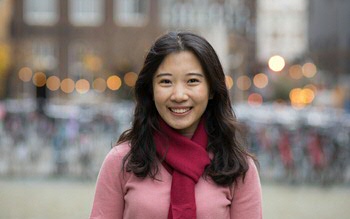‘In Myanmar, een arm land, zijn die dingen een groot taboe’

Thaint Thaint Thwe uit Myanmar (26) volgt de tweejarige master Clinical and Psychosocial Epidemiology. Een beurs van het Eric Bleumink Fonds voor studenten uit ontwikkelingslanden maakte het voor haar mogelijk om in Groningen te gaan studeren.
Naar Groningen komen was geen sinecure voor Thaint Thaint Thwe. In haar thuisland Myanmar kon ze geen visum krijgen, want die geeft de Nederlandse ambassade daar niet uit. Dus moest ze naar Thailand, maar de coronapandemie maakte dat nogal ingewikkeld. ‘Er werden geen toeristen toegelaten, je kon alleen het land in als je een doktersafspraak had.’
Die wist ze te regelen, maar eenmaal in Thailand moest ze 14 dagen in quarantaine. ‘Toen was het nog steeds spannend, want er werd gezegd dat mensen uit Myanmar niet naar Nederland mochten. Uiteindelijk werd er een uitzondering voor me gemaakt omdat ik student was.’ Het had allemaal niet veel langer moeten duren en leuk was anders, ‘maar ik kon in die twee weken Thailand wel lekker veel lezen ter voorbereiding op mijn master.’
Sinds ze in oktober aankwam in Groningen heeft ze een aantal colleges gehad, waarvan de meeste online. ‘Ik vind het niet zo erg, ik geniet van mijn tijd hier. Laatst heb ik een fiets gekocht, zodat ik de stad en omgeving kan verkennen. Ondanks dat er weinig ‘echte’ colleges zijn ontmoet ik nieuwe mensen, alleen al in mijn studentenhuis.’ Studeren is hier anders, merkt ze. ‘Veel actiever dan in Myanmar. Daar is het de bedoeling dat je luistert en aantekeningen maakt, hier word je aangemoedigd om vragen te stellen. Ik ben moed aan het verzamelen om dat te doen.’
Waarom het Groningen werd? Vier jaar geleden deed Thaint een rondje Europa met haar broer die promoveert in Hamburg. ‘We deden ook Groningen aan, en ik was meteen verkocht. Wat een leuke stad. Toen ik hoorde dat de medische faculteit er ook nog erg goed was, wist ik: ik ga in Groningen studeren.’
In Rangoon, de grootste stad van haar thuisland Myanmar, had ze na haar studie geneeskunde een jaar gewerkt bij Marie Stopes International. Die organisatie zet zich in voor geboorteregeling en anticonceptie – reproductive choices is de leus. ‘In Myanmar, een arm land, zijn die dingen een groot taboe. Ik vind het belangrijk om te helpen dat taboe te doorbreken, want het weerhoudt veel mensen ervan om goede zorg te vragen.’
Ze wil graag verder in die sector, en dan het liefst psychologische hulp bieden. Vandaar dat ze in Groningen een master zocht op het gebied van psychologie. Toen die eenmaal gevonden was, ontdekte ze in een Facebookgroep voor internationale studenten de beurs van het Eric Bleumink Fonds. ‘Ik wist dat ik zonder beurs niet naar Groningen zou kunnen, want het collegegeld en de woonkosten zijn anders gewoon niet te betalen. Dat geldt voor veel studenten van buiten Europa, hoor ik om me heen. Het was behoorlijk spannend of ik toegelaten zou worden, want ik moest onder andere een statistiektoets doen, en daar wist ik helemaal niets van. In maart hoorde ik dat ik toegelaten was. Ik sprong een gat in de lucht, het is een geweldige kans.’
Tekst: Dorien Vrieling
Foto: Gerhard Taatgen
Bron: Broerstraat 5
